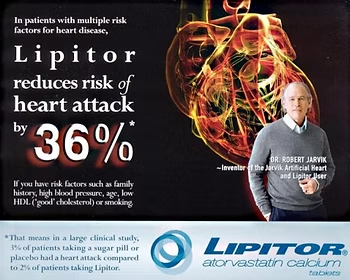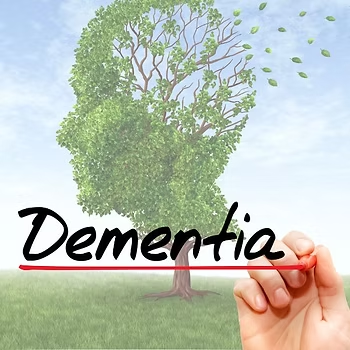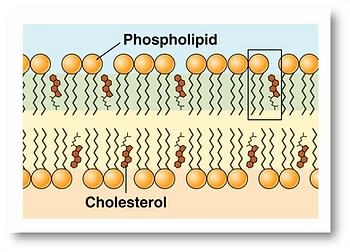Many people are currently taking medications such as Lipitor to lower their cholesterol levels in hopes to achieve better health. However, these medications (particularly statins) come at a risk of dangerous side effects and MINIMAL benefits.
There is a lot of research showing the benefits and risks of taking statin-based medications, but what does that mean for you?
Every single cell in your body has a membrane made from phospholipids which regulate the flow of nutrients and waste into and out of the cell. This membrane is two layers thick. In between these phospholipids are cholesterol particles. Typically about 25% to 30% of each cell’s membrane layers are composed of cholesterol. Cholesterol also helps to form the mitochondria inside the cells.
Due to its role in the cell membrane, cholesterol is a very important component of our overall health. In fact, cholesterol is so important to your cellular functions that human breast milk is absolutely loaded with the compound.
Cholesterol-lowering medications such as statins not only work to reduce the presence of cholesterol in your bloodstream but will also reduce the cholesterol in your cells’ membranes (this is very, very, very bad!!!).

Unfortunately, that claim came with an asterisk, signaling more information in small letters down below. This added note read, “That means in a large clinical study, 3% of patients taking a sugar pill or placebo had a heart attack compared to 2% of patients taking Lipitor.
Is this claim technically true? Yes. But is it significant enough for you to take the risk? No. In fact, only a 1% decrease in risk would be considered negligible to most people.
This is ONLY a 1% benefit. Would you still have a job if you were only 1% effective at work?
The Risks of Statins
According to research published in the Journal of the American Medical Association in March of 2022, taking statin-based medications only reduced risk of all possible causes of mortality by 0.8%. On top of that, risk of heart attacks were reduced by only 1.3%, and risk of stroke was only 0.4%.
Side effects, on the other hand, are shown to have significantly higher risks of side effects. After a study conducted by the FDA in 2012, the administration ordered black box warnings (the most severe warning any medication can receive) for all statin-based drugs due to an increased risk of negative side effects including:
- Memory loss
- Cognitive dysfunction
- Amnesia
- Confusion

Other studies have shown that the risk of these side effects increases by 10% when taking statin-based medications.
The Research
In June of 2021, another study claimed that statins doubled the risk of developing dementia. Just like every other cell in your body, your brain cells need cholesterol to function. Taking a medication that reduces your cholesterol levels also reduces them in the brain, causing significant decline in cellular function in the one organ you arguably need to function the best.
That same study compared the cognitive functions of patients on statin-based drugs and so-called “non-users.” They used PET imaging to track the health of the brain, and showed that statin users had a significant decline in the metabolism of the posterior cingulate, or the portion of your brain known to decline the most in the early stages of Alzheimer’s disease. By contrast, non-users showed no such decline, even if they had higher baseline cholesterol levels.
The cingulate is a very important part of the brain. It is responsible for many functions, including:
- Connecting sensory input to emotions
- Emotional responses to pain
- Regulating aggressive behavior
- Communication
- Maternal bonding
- Language expression
- Decision making
Other studies showed a decrease in muscle function due to lowered presence of mitochondria, and increased risk of osteoporosis. Yet more showed no benefit for preventing cardiovascular events in older adults.
What Should You Do About Your Cholesterol?
I regularly write and speak about the benefits of getting bloodwork done. There are many resources on my website which can help you find those answers. I also recommend speaking to your doctor about other options aside from statin-based medications.
I am also available for consultations and will gladly help you get the bloodwork done that you need in order to find your answers. Together, we can make a plan to work towards your overall health goals, and get you back where you need to be.
Frequently Asked Questions (FAQ)
Statins can carry risks such as memory loss, confusion, cognitive decline, and increased risk of dementia, while providing only minimal benefit in reducing heart attack and stroke risk.
Research shows that statins lower the risk of heart attack by only about 1%, a benefit many experts consider negligible compared to the risks.
Cholesterol helps build cell membranes, supports mitochondria, and is critical for brain health. Even human breast milk is rich in cholesterol, highlighting its importance.
Alternatives include comprehensive bloodwork, functional medicine approaches, and lifestyle changes such as diet, exercise, and addressing underlying inflammation. Consulting with a doctor or specialist can help find safer solutions.








